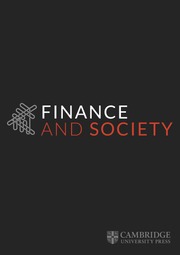No CrossRef data available.
Article contents
In the future, toward death: Finance capitalism and security in Don DeLillo's ‘Cosmopolis’
Published online by Cambridge University Press: 09 November 2023
Abstract
This article develops a reading of Don DeLillo's novel Cosmopolis that differentiates between two thematic and poetological axes running through the text. On the one hand, Cosmopolis explores the future-fixation of the risk regime of finance capitalism; on the other, it stages scenes of insecurity that physically threaten the protagonist and his world. Insecurity, the article argues, is a condition that throughout the text increasingly gains in appeal because it promises to offer an alternative to a world of managed risk. The concern with security emphasizes finitude and mortality, thus enabling a turn to existential matters that the virtual abstractions of finance have seemingly made inaccessible. While proposing an opposition between a logic of risk based on virtuality and a logic of (in)security based on authenticity, DeLillo's novel also suggests that it is impossible to break out of the logic of risk management pervading late modernity. The appeal of (in)security articulated in Cosmopolis rather lies in the promise to existentially revitalize life within the confines of financialized capitalism.
- Type
- Article
- Information
- Creative Commons
- This is an Open Access article, distributed under the terms of the Creative Commons Attribution-NonCommercial-No Derivatives licence (http://creativecommons.org/licenses/by-nc-nd/4.0/), which permits noncommercial re-use, distribution, and reproduction in any medium, provided the original work is unaltered and is properly cited. The written permission of Cambridge University Press must be obtained for commercial re-use or in order to create a derivative work.
- Copyright
- © 2018 The Author(s)


